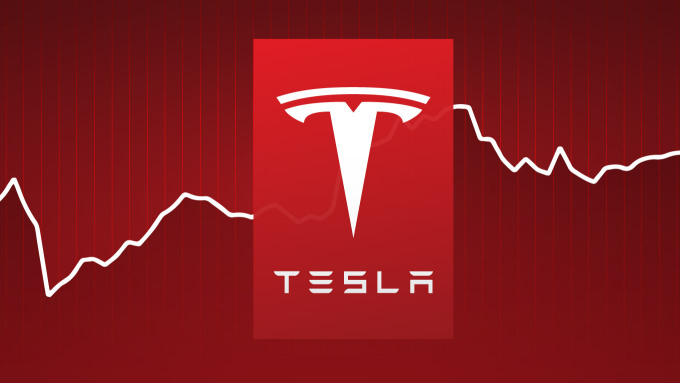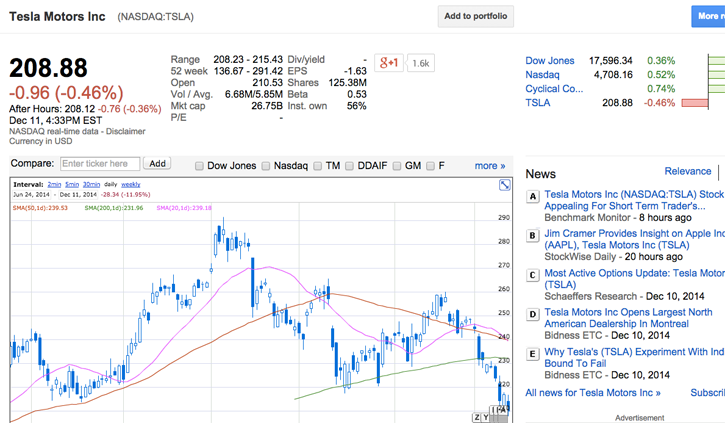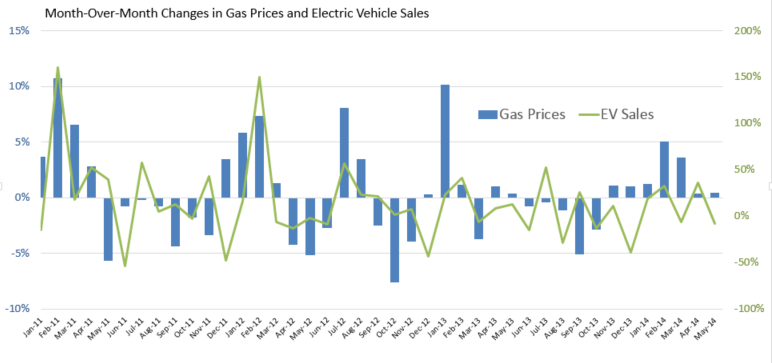Investor's Corner
Oil Prices Sinking Tesla Motors Stock?


As I was watching a recent webinar on forward-looking trending tools for stocks, the moderator popped Tesla Motors stock chart on the screen to demonstrate the Fibonacci retracement and Ichimoku tools. Perfect timing, I’m a long investor in Tesla Motors stock and what about these downward oil prices?
Financial media sites are in a tizzy regarding oil prices plummeting—Saudis pulling the strings—and how this poses a big hurt for electric car industry sales and, of course, Tesla Motors stock price. Sine I cover the oil and gas industry for the Chicago-based Automation World magazine, the Saudis’ primary “displacement” target is U.S. shale.
Fracking shale plays are very expensive due to the fact that oil and gas drilling companies have to setup so many wells in order to find shale sweet spots. Plus, these small-to-medium sized drillers are financially over-leveraged and need barrel prices to be somewhere around $80 a barrel in order to be profitable. That’s not going to happen for some time, did I say “displacement.”
However, it does begs the question whether there is a decent correlation between high gas prices and electric car sales in the last four years, and will lower gas prices doom Tesla Motors’s stock price for the near-term or long-term?
As a Energy Information Agency chart shows above, there’s not a direct correlation between sales and increase gas prices. However, I believe some EV automakers will take a hit from really low gas prices in 2015–say $2.10-2.20– but not Tesla Motors.
Why? Tesla Motors owners are not obsessed with the price of power for their car, compared to a Volt or Leaf owner is my theory, and this car just won the award for the highest satisfaction from Consumer Reports, two years running.
Plus, Americans are buying more expensive cars, north of $50,000. TrueCar just this week released data on buying patterns and showed:
From January through November 931,064 vehicles were sold in the U.S. with average price above $50,000, a whopping 30.8 percent increase compared to the same period last year, according to TrueCar.
So with lower oil prices soon to be a non-issue or baked into Tesla’s current stock price, is it attractive at $210 or lower? How long will this downward, selling pressure last?
Ishimoku technicals (forward-looking indicators) point to new lows being tested in the near term, such as the $203 level. So Tesla shorting could continue and recent data shows 23% of Tesla stock owners were shorting in November.
According to John Del Vecchio and Tom Jacobs’ book What’s Behind the Numbers? (via a Nasdaq.com article), this is why you short a stock:
We recommend waiting until there is aggressive revenue recognition, weakening balance sheets, and deteriorating cash flow trends. It’s the flipside of value-with-catalyst, which is fundamental analysis of value combined with a catalyst for stock market buying to boost the price to realize that value.
As most Tesla Motors investors and followers know, the company’s cash flow is quite positive and revenue is on solid-footing with production capacity investments made in 2014, and the company’s estimate of 50,000 vehicles delivered in 2015. In 2014, Tesla will probably deliver just under 35,000 vehicles, a solid increase.
So there may be an opportunity to buy in the near-term for longs, as I feel the oil price “news” won’t really affect Tesla sales in 2015. One caveat, although, is to keep an eye on Model X news and possible struggles in hitting a 250 mile range for this coveted SUV. This could dampen the stock price if problems persist.

Elon Musk
Tesla stock gets latest synopsis from Jim Cramer: ‘It’s actually a robotics company’
“Turns out it’s actually a robotics and Cybercab company, and I want to buy, buy, buy. Yes, Tesla’s the paper that turned into scissors in one session,” Cramer said.

Tesla stock (NASDAQ: TSLA) got its latest synopsis from Wall Street analyst Jim Cramer, who finally realized something that many fans of the company have known all along: it’s not a car company. Instead, it’s a robotics company.
In a recent note that was released after Tesla reported Earnings in late January, Cramer seemed to recognize that the underwhelming financials and overall performance of the automotive division were not representative of the current state of affairs.
Instead, we’re seeing a company transition itself away from its early identity, essentially evolving like a caterpillar into a butterfly.
The narrative of the Earnings Call was simple: We’re not a car company, at least not from a birds-eye view. We’re an AI and Robotics company, and we are transitioning to this quicker than most people realize.
Tesla stock gets another analysis from Jim Cramer, and investors will like it
Tesla’s Q4 Earnings Call featured plenty of analysis from CEO Elon Musk and others, and some of the more minor details of the call were even indicative of a company that is moving toward AI instead of its cars. For example, the Model S and Model X will be no more after Q2, as Musk said that they serve relatively no purpose for the future.
Instead, Tesla is shifting its focus to the vehicles catered for autonomy and its Robotaxi and self-driving efforts.
Cramer recognizes this:
“…we got results from Tesla, which actually beat numbers, but nobody cares about the numbers here, as electric vehicles are the past. And according to CEO Elon Musk, the future of this company comes down to Cybercabs and humanoid robots. Stock fell more than 3% the next day. That may be because their capital expenditures budget was higher than expected, or maybe people wanted more details from the new businesses. At this point, I think Musk acolytes might be more excited about SpaceX, which is planning to come public later this year.”
He continued, highlighting the company’s true transition away from vehicles to its Cybercab, Optimus, and AI ambitions:
“I know it’s hard to believe how quickly this market can change its attitude. Last night, I heard a disastrous car company speak. Turns out it’s actually a robotics and Cybercab company, and I want to buy, buy, buy. Yes, Tesla’s the paper that turned into scissors in one session. I didn’t like it as a car company. Boy, I love it as a Cybercab and humanoid robot juggernaut. Call me a buyer and give me five robots while I’m at it.”
Cramer’s narrative seems to fit that of the most bullish Tesla investors. Anyone who is labeled a “permabull” has been echoing a similar sentiment over the past several years: Tesla is not a car company any longer.
Instead, the true focus is on the future and the potential that AI and Robotics bring to the company. It is truly difficult to put Tesla shares in the same group as companies like Ford, General Motors, and others.
Tesla shares are down less than half a percent at the time of publishing, trading at $423.69.
Elon Musk
Tesla to a $100T market cap? Elon Musk’s response may shock you

There are a lot of Tesla bulls out there who have astronomical expectations for the company, especially as its arm of reach has gone well past automotive and energy and entered artificial intelligence and robotics.
However, some of the most bullish Tesla investors believe the company could become worth $100 trillion, and CEO Elon Musk does not believe that number is completely out of the question, even if it sounds almost ridiculous.
To put that number into perspective, the top ten most valuable companies in the world — NVIDIA, Apple, Alphabet, Microsoft, Amazon, TSMC, Meta, Saudi Aramco, Broadcom, and Tesla — are worth roughly $26 trillion.
Will Tesla join the fold? Predicting a triple merger with SpaceX and xAI
Cathie Wood of ARK Invest believes the number is reasonable considering Tesla’s long-reaching industry ambitions:
“…in the world of AI, what do you have to have to win? You have to have proprietary data, and think about all the proprietary data he has, different kinds of proprietary data. Tesla, the language of the road; Neuralink, multiomics data; nobody else has that data. X, nobody else has that data either. I could see $100 trillion. I think it’s going to happen because of convergence. I think Tesla is the leading candidate [for $100 trillion] for the reason I just said.”
Musk said late last year that all of his companies seem to be “heading toward convergence,” and it’s started to come to fruition. Tesla invested in xAI, as revealed in its Q4 Earnings Shareholder Deck, and SpaceX recently acquired xAI, marking the first step in the potential for a massive umbrella of companies under Musk’s watch.
SpaceX officially acquires xAI, merging rockets with AI expertise
Now that it is happening, it seems Musk is even more enthusiastic about a massive valuation that would swell to nearly four-times the value of the top ten most valuable companies in the world currently, as he said on X, the idea of a $100 trillion valuation is “not impossible.”
It’s not impossible
— Elon Musk (@elonmusk) February 6, 2026
Tesla is not just a car company. With its many projects, including the launch of Robotaxi, the progress of the Optimus robot, and its AI ambitions, it has the potential to continue gaining value at an accelerating rate.
Musk’s comments show his confidence in Tesla’s numerous projects, especially as some begin to mature and some head toward their initial stages.
Elon Musk
Tesla director pay lawsuit sees lawyer fees slashed by $100 million
The ruling leaves the case’s underlying settlement intact while significantly reducing what the plaintiffs’ attorneys will receive.

The Delaware Supreme Court has cut more than $100 million from a legal fee award tied to a shareholder lawsuit challenging compensation paid to Tesla directors between 2017 and 2020.
The ruling leaves the case’s underlying settlement intact while significantly reducing what the plaintiffs’ attorneys will receive.
Delaware Supreme Court trims legal fees
As noted in a Bloomberg Law report, the case targeted pay granted to Tesla directors, including CEO Elon Musk, Oracle founder Larry Ellison, Kimbal Musk, and Rupert Murdoch. The Delaware Chancery Court had awarded $176 million to the plaintiffs. Tesla’s board must also return stock options and forego years worth of pay.
As per Chief Justice Collins J. Seitz Jr. in an opinion for the Delaware Supreme Court’s full five-member panel, however, the decision of the Delaware Chancery Court to award $176 million to a pension fund’s law firm “erred by including in its financial benefit analysis the intrinsic value” of options being returned by Tesla’s board.
The justices then reduced the fee award from $176 million to $70.9 million. “As we measure it, $71 million reflects a reasonable fee for counsel’s efforts and does not result in a windfall,” Chief Justice Seitz wrote.
Other settlement terms still intact
The Supreme Court upheld the settlement itself, which requires Tesla’s board to return stock and options valued at up to $735 million and to forgo three years of additional compensation worth about $184 million.
Tesla argued during oral arguments that a fee award closer to $70 million would be appropriate. Interestingly enough, back in October, Justice Karen L. Valihura noted that the $176 award was $60 million more than the Delaware judiciary’s budget from the previous year. This was quite interesting as the case was “settled midstream.”
The lawsuit was brought by a pension fund on behalf of Tesla shareholders and focused exclusively on director pay during the 2017–2020 period. The case is separate from other high-profile compensation disputes involving Elon Musk.









